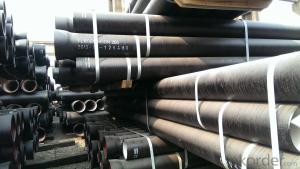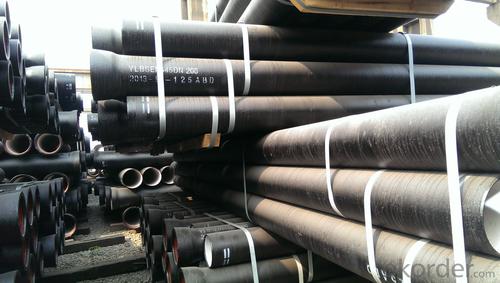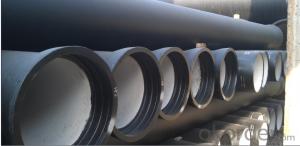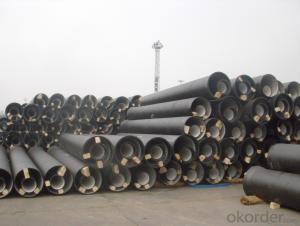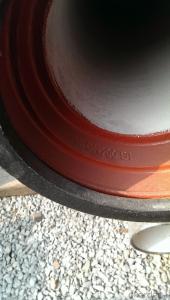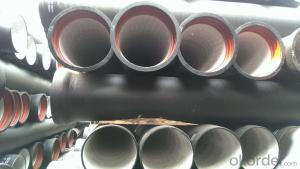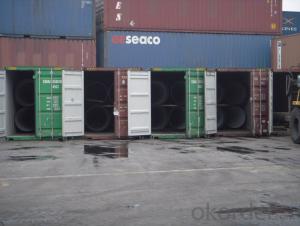DUCTILE IRON PIPE K12 DN 1000 SOCKET SPIGOT PIPES
- Loading Port:
- Tianjin
- Payment Terms:
- TT OR LC
- Min Order Qty:
- 25 m.t.
- Supply Capability:
- 30000 m.t./month
OKorder Service Pledge
OKorder Financial Service
You Might Also Like
1) The standard of pipe: ISO2531:1998, EN545:2006,K9 K8
2) Effective length: 6m/5.7m
3) Inner cement line: Portland cement lineas per ISO4179
4) Zinc coating: at least 130g/m2 as per ISO8179
5) Bitumen painting: at least 70μm as per ISO8179
6)With 102% quantity of NBR, SBR, or EPDM ring asper ISO4633
7) DN80-DN1200
8) Highstrength, lighter than grey iron, good corrosion resistance, no furring, smallflow resistance, easy fixing, long life tome about 100 yeas
9)Checked by automatic inspection equipment
10) Composition:
Chemical composition | |||
Chemical composition | Ductile Cast Iron Pipe (%) | Grey iron pipe (%) | Steel pipe (%) |
C | 3.5-4.0 | 3.2-3.8 | 0.1-0.2 |
Si | 1.9-2.6 | 1.4-2.2 | 0.15-0.4 |
Mn | 0.15-0.45 | 0.4-0.6 | 0.3-0.6 |
P | ≤0.06 | ≤0.3 | 0.02-0.03 |
S | ≤0.02 | ≤0.1 | 0.02-0.03 |
Mg | 0.03-0.06 |
|
|
11) Feature:
Mechanical properties | |||
| Ductile Cast Iron Pipe | Grey Iron Pipe | Steel Pipe |
Tensile Strength(Mpa) | ≥420 | 150-260 | ≥400 |
Yield Strength(Mpa) | ≥300 | No Confirmation | No Confirmation |
Bending Strength(Mpa) | ≥590 | 200-360 | ≥400 |
Elongation (%) | ≥10 | Neglected | ≥18 |
Brinell Hardness(HBS) | ≤230 | ≤230 | About 140 |
12) T type mechanical joint
13) Packing: in bulk or container
PACKING: 1) Pipesare bundled together with the steel belt.
2) Wooden pieces are put between the pipes.
- Q: An urban infrastructure construction, water supply pipe is ductile iron pipe and PE pipe, thank you
- Because the construction of municipal water supply pressure will be relatively large, generally used in the selection of pipe centrifugal ductile iron pipe, he has properties of iron essence and steel, excellent corrosion resistance, good ductility, good sealing effect, simple installation, ductile iron pipe is mainly used for municipal, industrial and mining enterprises, water supply, gas, oil etc.
- Q: Are ductile iron pipes resistant to acid attacks?
- Generally, ductile iron pipes exhibit resistance to acid attacks. Ductile iron, a form of cast iron which has undergone magnesium treatment to enhance its strength and ductility, produces a more durable material capable of withstanding corrosive conditions, including acids. Nevertheless, it is crucial to acknowledge that the resistance level may vary depending on the specific acid type and concentration involved. In highly corrosive environments, where powerful acids or high concentrations are present, it may be necessary to implement additional protective measures such as applying a lining or coating to the pipes. Moreover, regular inspection and maintenance are vital to ensure the long-term durability and resistance of ductile iron pipes.
- Q: Can ductile iron pipe be used for geothermal heat exchange systems?
- Indeed, geothermal heat exchange systems can utilize ductile iron pipe. Renowned for its robustness and resilience, ductile iron pipe is perfectly suited to withstand the elevated temperatures and pressures typically found in such systems. Moreover, its exceptional resistance to corrosion is of utmost importance in geothermal applications, where minerals and chemicals present in the earth can induce corrosion. Additionally, the commendable thermal conductivity of ductile iron pipe facilitates efficient heat transfer within geothermal systems. In conclusion, ductile iron pipe stands as a dependable and economical option for geothermal heat exchange systems.
- Q: What are the different types of fittings available for ductile iron pipe?
- There are several different types of fittings available for ductile iron pipe. These fittings are designed to connect, redirect, or branch off the pipe in various configurations to suit different plumbing or piping systems. One common type of fitting is the flanged fitting, which features a flange or lip on one end that allows for easy bolted connection to another flanged component. Flanged fittings are commonly used in applications where a tight seal is required, such as in water or sewage systems. Another type of fitting is the mechanical joint fitting, which utilizes a gasket and a set of mechanical bolts to create a secure connection between two pieces of pipe. Mechanical joint fittings are often used in underground water or sewer systems. Push-on fittings are another popular option for ductile iron pipe. These fittings have a rubber gasket that is compressed onto the pipe, creating a watertight seal. Push-on fittings are quick and easy to install, making them ideal for applications where speed and efficiency are important. For situations where a change in direction is required, ductile iron pipe fittings such as elbows or bends are used. These fittings are designed to smoothly change the direction of the pipe without causing any significant flow restrictions. Additionally, there are saddle fittings available for ductile iron pipe. These fittings are used to create a branch connection on an existing pipeline without the need for cutting or welding. Saddle fittings are commonly used in irrigation or fire protection systems. Overall, the different types of fittings available for ductile iron pipe provide a range of options to meet the specific needs of different plumbing or piping systems. Whether it's flanged fittings for a tight seal, mechanical joint fittings for underground applications, push-on fittings for quick installation, or specialized fittings like elbows or saddle fittings, each type serves a specific purpose in the overall plumbing or piping system.
- Q: What are the different methods for testing ductile iron pipe?
- There are several methods available for testing ductile iron pipe to ensure its quality and reliability. These methods include: 1. Hydrostatic Testing: This is the most common method used for testing ductile iron pipe. It involves filling the pipe with water and pressurizing it to a specified level. The pipe is then inspected for any leaks or deformations under the applied pressure. Hydrostatic testing helps determine the pipe's ability to withstand internal pressure without failure. 2. Tensile Testing: This method involves subjecting a sample of the ductile iron pipe to a gradually increasing tensile load until it fractures. The test measures the ultimate tensile strength, yield strength, and elongation of the material. Tensile testing helps evaluate the pipe's mechanical properties and its ability to withstand tension without breaking. 3. Hardness Testing: This method measures the hardness of the ductile iron pipe using various techniques such as Brinell, Rockwell, or Vickers hardness tests. Hardness testing provides information about the material's resistance to deformation, wear, and fatigue. It helps assess the pipe's durability and resistance to external forces. 4. Impact Testing: This method involves striking a notched sample of the ductile iron pipe with a pendulum or falling weight to measure its impact resistance. The test determines the material's ability to absorb energy during sudden loading or impact. Impact testing helps evaluate the pipe's ability to withstand accidental impacts or dynamic loads. 5. Ultrasonic Testing: This non-destructive testing method uses high-frequency sound waves to detect internal defects or discontinuities in the ductile iron pipe. Ultrasonic testing can identify voids, cracks, or inclusions that may affect the pipe's structural integrity. It helps ensure the pipe's soundness and reliability. 6. Magnetic Particle Testing: This method is primarily used for detecting surface or near-surface defects in the ductile iron pipe. It involves applying a magnetic field to the pipe and then applying magnetic particles to the surface. Any defects present will cause the magnetic particles to gather and form visible indications. Magnetic particle testing helps identify surface cracks, laps, or other defects that may affect the pipe's performance. These different testing methods help ensure that ductile iron pipe meets industry standards and specifications, ensuring its quality and reliability in various applications.
- Q: What is the relationship between the direction of the spigot and the direction of the flow in the ductile iron pipe?
- Use more than 18 casting molten iron, by adding the spheroidizing agent, through the centrifugal ductile iron machine high-speed centrifugal casting pipe
- Q: Ductile iron gears are generally treated without heat treatment
- The mechanical properties of ductile iron are equivalent to quenched and tempered steel. The gears made of ductile iron can be quenched or tempered by high temperature + surface quenching, that is, quenching and tempering treatment + surface hardening.
- Q: Are ductile iron pipes resistant to biological growth?
- Indeed, ductile iron pipes exhibit a general resistance to biological growth. Ductile iron, a robust and enduring substance, finds widespread application in water and sewage systems. Its sleek exterior hampers the proliferation of bacteria, fungi, and other microorganisms that foster biological growth. Moreover, ductile iron pipes frequently receive protective linings or coatings, for instance, cement mortar or epoxy, which heighten their resistance to biological growth. Nevertheless, it is crucial to acknowledge that no material remains entirely impervious to biological growth, necessitating regular maintenance and cleansing of the pipes to ensure sustained resilience in the long run.
- Q: How does ductile iron pipe compare to PVC pipe in terms of strength?
- Ductile iron pipe is generally considered to be stronger than PVC pipe. Ductile iron pipe is made of iron and carbon, which gives it a high tensile strength and resistance to breakage. It can withstand high pressures and is commonly used in heavy-duty applications such as water mains, sewer lines, and industrial piping. On the other hand, PVC pipe is made of a plastic material called polyvinyl chloride. While PVC pipe is lightweight and easy to handle, it is not as strong as ductile iron pipe. PVC pipe is typically used in low-pressure applications such as household plumbing, irrigation systems, and drainage pipes. When comparing the strength of ductile iron pipe to PVC pipe, the former has a higher capacity to handle heavy loads, withstand ground movement, and resist damage from external factors like rocks or tree roots. Ductile iron pipe is also more durable and has a longer lifespan compared to PVC pipe. However, it is important to note that the choice between ductile iron pipe and PVC pipe ultimately depends on the specific requirements of the project. Factors such as cost, environmental conditions, installation ease, and required longevity should all be taken into consideration when deciding which type of pipe to use.
- Q: Do ductile iron pipes require pressure testing before installation?
- Yes, ductile iron pipes typically require pressure testing before installation to ensure their integrity and ability to withstand the required pressure and flow conditions.
Send your message to us
DUCTILE IRON PIPE K12 DN 1000 SOCKET SPIGOT PIPES
- Loading Port:
- Tianjin
- Payment Terms:
- TT OR LC
- Min Order Qty:
- 25 m.t.
- Supply Capability:
- 30000 m.t./month
OKorder Service Pledge
OKorder Financial Service
Similar products
Hot products
Hot Searches
Related keywords
